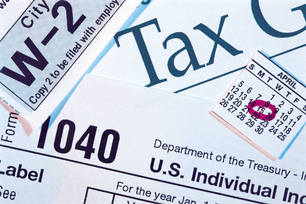
Is there any chance you will be purchasing a new home in the next two years? You should know that mortgage lenders are requiring that you provide your last two years of Federal Tax Returns during the loan process.
A decade ago these were rarely asked for but today lenders require your entire personal and business (if you own more than 50% of the business) Federal Tax returns. Lenders will also want more than just the first two pages, or Form 1040. Lenders must review all schedules, forms and exhibits on a tax return and they will also request a signed Form 4506-T which will permit the lender to obtain transcripts in addition to the returns themselves.
The question is why do lenders need tax returns? Lenders look for irregularities and the figures are used to determine the borrower’s actual income figure, per guidelines. If you’re self-employed your income is determined by a pattern of gross income versus reported expenses while adding back in deductions that are tax expenses only such as depletion and depreciation. If you’re a employee that receives a W-2 and does not own your business your taxes may still affect your income.
“Unreimbursed Employment Business Expenses”, reported on your Federal Tax Returns under Schedule A and Form 2106 are typically subtracted from your income and, if significant, may affect your ability to qualify for your home purchase. Some common items that may be reflected on a Form 2106 include union dues, mileage, uniforms, cell phones, marketing and travel.
Another income or loss that is reviewed is the income or loss from rental properties. This income must be documented and supported via a personal tax return if the property was purchased during the previous tax return year in order for it to be considered in your loan approval. If the property has been acquired since the previous tax year, the borrower will be asked to provide evidence of receipt of rent (bank statements, cancelled checks, etc.) and a copy of the rental agreement in which case a vacancy factor of 25% will be considered.
Your own business losses may be reflected on your tax return but what about your spouse? If you are a W-2 employee but your spouse is self-employed and shows a loss on their income, it will be deducted from your gross income when the lender determines your usable income for mortgage approval purposes.
Capital gains and losses are also reflected on your tax returns and may impact your income as well.
Of coure, self-employed borrowers often feel the brunt of tax return scrutiny. Many self-employed borrowers find that while their bookkeepers or tax preparers are trained to reduce their taxable income figures to save on taxes for any given year, those figures may reduce the amount of mortgage a borrower may obtain for their home purchase. You may be asking, “Can’t I amend my return if needed to qualify?” Lenders and underwriters are aware of the strategy and the concern is that taxes should be a reflection of your true income and expenses. Amending them to qualify for a loan will likely trigger a rejection of the increased income figure and is not an assured way to reflect to the lender your true earnings which are capitol to your ability to repay your mortgage.
Is there a chance you will be purchasing a new home within the next two years? If so, you need to know where you are before you will know where you need to be when it comes to mortgage approval. It would be my pleasure to review your current mortgage qualification before you file your 2014 Federal Taxes.
I am a loan officer with San Diego Funding and I work around the schedule of my clients including evening and weekends. If you or anyone you know has financing needs or questions please.
Gisela N Sanchez
Realtor with Pacific Sotheby’s International Real Estate
619-254-6066 [email protected]
Cal BRE #01765802
Deja Correia
Senior Loan Officer, San Diego Funding
Office: 619.260.1660 ext. 228
Cell: 619.251.1432
Fax: [email protected]
NMLS: 413050 Cal BRE # 01904562
